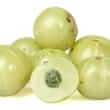Background
- Indian gooseberry (Emblica officinalis), also known as amalaki, is a small- to medium-sized deciduous tree native to India and the Middle East. In addition to its medicinal uses, the fruits are often eaten raw and used as ingredients for various Indian recipes.
- In folk medicine, dried and fresh Indian gooseberry is used, including the fruit, seed, leaves, root, bark, and flowers. Traditionally, Indian gooseberry is used alone and in combination with various Ayurvedic herbs for various medical conditions, including pancreatitis, hepatitis, inflammation, cancer, diabetes, obesity, kidney disease, and stomach problems. It is also considered a natural adaptogen.
- Indian gooseberry juice contains high levels of vitamin C. Ayurvedic preparations that contain Indian gooseberry may increase the concentration of ascorbic acid by up to three times.
- Indian gooseberry has been studied for its effects on diabetes, eye diseases and high cholesterol. However, more research is needed before conclusions can be made in these areas.
References
Natural Standard developed the above evidence-based information based on a thorough systematic review of the available scientific articles. For comprehensive information about alternative and complementary therapies on the professional level, go to . Selected references are listed below.
- D'Souza, P., Amit, A., Saxena, V. S., et al. Antioxidant properties of Aller-7, a novel polyherbal formulation for allergic rhinitis. Drugs Exp.Clin.Res. 2004;30(3):99-109.
View Abstract - Jacob, A., Pandey, M., Kapoor, S., et al. Effect of the Indian gooseberry (amla) on serum cholesterol levels in men aged 35-55 years. Eur J Clin.Nutr. 1988;42(11):939-944.
View Abstract - Jose, J. K. and Kuttan, R. Hepatoprotective activity of Emblica officinalis and Chyavanaprash. J Ethnopharmacol. 2000;72(1-2):135-140.
View Abstract - Kumar, M. S., Kirubanandan, S., Sripriya, R., et al. Triphala promotes healing of infected full-thickness dermal wound. J Surg.Res. 2008;144(1):94-101.
View Abstract - Rajak, S., Banerjee, S. K., Sood, S., et al. Emblica officinalis causes myocardial adaptation and protects against oxidative stress in ischemic-reperfusion injury in rats. Phytother.Res. 2004;18(1):54-60.
View Abstract - Sabu, M. C. and Kuttan, R. Anti-diabetic activity of medicinal plants and its relationship with their antioxidant property. J Ethnopharmacol. 2002;81(2):155-160.
View Abstract - Srikumar, R., Parthasarathy, N. J., Shankar, E. M., et al. Evaluation of the growth inhibitory activities of Triphala against common bacterial isolates from HIV infected patients. Phytother.Res. 2007;21(5):476-480.
View Abstract - Yokozawa, T., Kim, H. Y., Kim, H. J., et al. Amla (Emblica officinalis Gaertn.) prevents dyslipidaemia and oxidative stress in the ageing process. Br.J Nutr. 2007;97(6):1187-1195.
View Abstract







